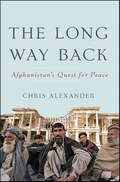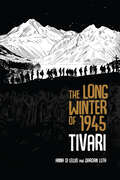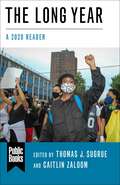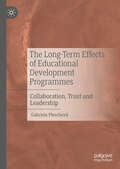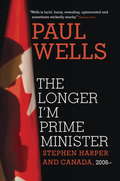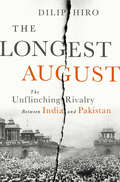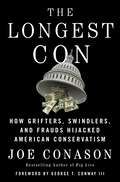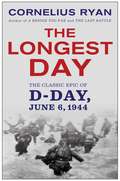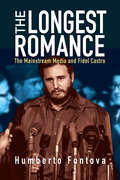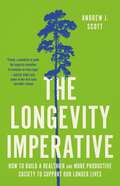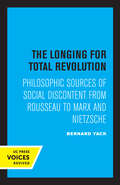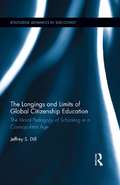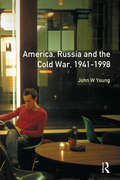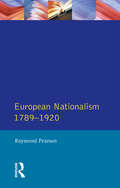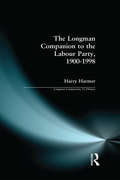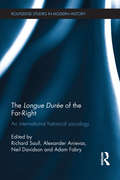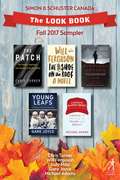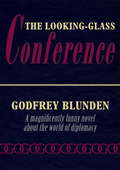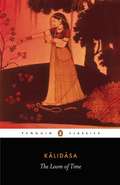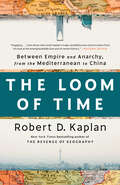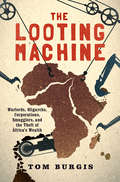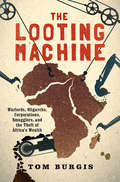- Table View
- List View
The Long Way Back: Afghanistan's Quest for Peace (Wayfarers Ser.)
by Chris AlexanderChristopher Alexander, Canadian’s former ambassador to Afghanistan, offers an inside look at Afghanistan recent history, and delivers a blueprint for transforming the troubled country into a viable nation. Alexander draws on expertise gained over five years on the ground in Afghanistan, chronicling the country’s initial successes following the Afghan War, the setbacks it incurred thanks to a resurgent Taliban, and the tenuous stability that multilateral diplomacy has brought the war-torn yet rebuilding nation. Readers of Ahmed Rashid’s Descent into Chaos and Alex Berenson’s Lost in Kandahar will find no more penetrating insight into Afghanistan’s past, present, and future than Christopher Alexander’s probing, expert dissection of a nation at war with itself: The Long Way Back.
The Long Winter of 1945: Tivari
by Anna Di Lellio Dardan LutaIn March 1945, at the end of the Second World War, hundreds of unarmed Albanian recruits were massacred by Yugoslav partisans. For too long, the memory of this massacre in Tivari – a coastal town in Montenegro –was suppressed by the Yugoslav state and kept alive in Kosovo only in informal versions, nurtured and retold in a spirit of ethnic mistrust and hatred. Depicted in graphic format, The Long Winter of 1945 presents an oral history of this traumatic event based on interviews with surviving participants. Archival documents and historical research provide context, placing the massacre in the broader setting of forced mass mobilization to fight, as well as the last pocket of Italian resistance. The Long Winter of 1945 situates the eventsin Tivari into the broader context of Yugoslavia’s war for liberation and the civil war between Serbs and Albanians. Bringing this traumatic event to the fore, this beautifully illustrated graphic novel rescues the memory of the victims and survivors from political exploitation.
The Long Year: A 2020 Reader (Public Books Series)
by Eric Klinenberg Joan Wallach Scott Julie Livingston Natalia Molina Jun Li Guobin Yang Andrew Lakoff Priscilla Wald Warwick Anderson Warren Breckman Adam Tooze Ananya Roy Sophie Lewis Neha Vora Margaret O'Mara Yarimar Bonilla Merlin Chowkwanyun Keeanga-Yamahtta Taylor Margaret Morganroth Gullette Marcia Chatelain Jacob A.C. Remes Joanne Randa Nucho Xiaowei Wang Miguel Centeno Jean-Paul Gagnon Keisha N. Blain Sulfikar Amir Mustafa Dikeç David Schmidt Gautam Bhan David S. Barnes Isabelle Guérin Andy Horowitz Simon Balto Éric Charmes Max Rousseau Michelle Cera Gilles Guiheux Ye Guo Renyou Hou Manon Laurent Anne-Valérie Ruinet Govindan Venkatasubramanian Mathieu Ferry Marine Al Dahdah Sherihan Radi Jeffrey Aaron Snyder Rachel Nolan Evan Lieberman Julia Foulkes Soledad Álvarez Velasco Sophie Gonick Alfonso Fierro Erick Corrêa Gianpaolo Biaocchi Jake Carlson Quentin Ravelli Rikki J. Dean Afsoun Afsahi Emily Beausoleil Selen A. Ercan Cordula Dittmer Daniel F. Lorenz Kathryn Cai Kavita SivaramakrishnanSome years—1789, 1929, 1989—change the world suddenly. Or do they? In 2020, a pandemic converged with an economic collapse, inequalities exploded, and institutions weakened. Yet these crises sprang not from new risks but from known dangers. The world—like many patients—met 2020 with a host of preexisting conditions, which together tilted the odds toward disaster. Perhaps 2020 wasn’t the year the world changed; perhaps it was simply the moment the world finally understood its deadly diagnosis.In The Long Year, some of the world’s most incisive thinkers excavate 2020’s buried crises, revealing how they must be confronted in order to achieve a more equal future. Keeanga-Yamahtta Taylor calls for the defunding of police and the refunding of communities; Keisha Blain demonstrates why the battle against racism must be global; and Adam Tooze reveals that COVID-19 hit hardest where inequality was already greatest and welfare states weakest. Yarimar Bonilla, Xiaowei Wang, Simon Balto, Marcia Chatelain, Gautam Bhan, Ananya Roy, and others offer insights from the factory farms of China to the elite resorts of France, the meatpacking plants of the Midwest to the overcrowded hospitals of India.The definitive guide to these ongoing catastrophes, The Long Year shows that only by exposing the roots and ramifications of 2020 can another such breakdown be prevented. It is made possible through institutional partnerships with Public Books and the Social Science Research Council.
The Long-Term Effects of Educational Development Programmes: Collaboration, Trust and Leadership
by Gabriela PleschováThis book investigates the long-term effects of educational development (ED) programmes on teaching perceptions and practices. The research draws comparisons between an ED programme at a university in the United Kingdom dedicated to advancing teaching, an international university where high-quality education is central to its mission, and two universities in Central and Eastern Europe with an ambition to rise in rankings and attract international students. It examines collaboration, trusting relationships and leadership as key drivers of effective practices. The book is a valuable resource for researchers, educational developers and higher education leaders .
The Longer I'm Prime Minister
by Paul WellsThe definitive portrait of Stephen Harper in power by this country's most trenchant, influential and surprising political commentator. Oh, he won, but he won't last. Oh, he may win again but he won't get a majority. Oh, his trick bag is emptying fast, the ads are backfiring, the people are onto him, and soon his own party will turn on him. And let me tell you, it couldn't happen to a nicer guy . . .Despite a constant barrage of outrage and disbelief from his detractors, Stephen Harper is on his way to becoming one of Canada's most significant prime ministers. He has already been in power longer than Lester B. Pearson and John Diefenbaker. By 2015, and the end of this majority term, he'll have caught up to Brian Mulroney. No matter the ups and downs, the triumphs and the self-inflicted wounds, Harper has been moving to build the Canada he wants--the Canada a significant proportion of Canadian voters want or they wouldn't have elected him three times. As Wells writes, "He could not win elections without widespread support in the land. . . . Which suggests that Harper has what every successful federal leader has needed to survive over a long stretch of time: a superior understanding of Canada."In The Longer I'm Prime Minister, Paul Wells explores just what Harper's understanding of Canada is, and who he speaks for in the national conversation. He explains Harper not only to Harper supporters but also to readers who can't believe he is still Canada's prime minister. In this authoritative, engaging and sometimes deeply critical account of the man, Paul Wells also brings us an illuminating portrait of Canadian democracy: "glorious, a little dented, and free."
The Longest August: The Unflinching Rivalry Between India and Pakistan
by Dilip HiroThe partitioning of British India into independent Pakistan and India in August 1947 occurred in the midst of communal holocaust, with Hindus and Sikhs on one side and Muslims on the other. More than 750,000 people were butchered, and 12 million fled their homes-primarily in caravans of bullock-carts-to seek refuge across the new border: it was the largest exodus in history. Sixty-seven years later, it is as if that August never ended. Renowned historian and journalist Dilip Hiro provides a riveting account of the relationship between India and Pakistan, tracing the landmark events that led to the division of the sub-continent and the evolution of the contentious relationship between Hindus and Muslims. To this day, a reasonable resolution to their dispute has proved elusive, and the Line of Control in Kashmir remains the most heavily fortified frontier in the world, with 400,000 soldiers arrayed on either side. Since partition, there have been several acute crises between the neighbors, including the secession of East Pakistan to form an independent Bangladesh in 1971, and the acquisition of nuclear weapons by both sides resulting in a scarcely avoided confrontation in 1999 and again in 2002. Hiro amply demonstrates the geopolitical importance of the India-Pakistan conflict by chronicling their respective ties not only with America and the Soviet Union, but also with China, Israel, and Afghanistan. Hiro weaves these threads into a lucid narrative, enlivened with colorful biographies of leaders, vivid descriptions of wars, sensational assassinations, gross violations of human rights-and cultural signifiers like cricket matches. The Longest August is incomparable in its scope and presents the first definitive history of one of the world’s longest-running and most intractable conflicts.
The Longest Con: How Grifters, Swindlers, and Frauds Hijacked American Conservatism
by Joe ConasonA sardonic chronicle of how conservatism turned into a racketeering enterprise – and why Donald Trump became the living emblem of the American right’s moral decay.The Longest Con tells the fascinating story of the partisan con artists who have corrupted conservative politics in our time, creating a toxic phenomenon that culminated in the election of Donald Trump, a bumptious fraud whose checkered career and tawdry retinue, including his presidential cabinet, have featured almost every variety of scam. But long before he appeared, Trump’s path to power was blazed by the motley horde of swindlers and quacks who preceded him.From the “professional anti-communists” (whose tactics even J. Edgar Hoover despised) to the “populist” grifters of the Tea Party movement and the religious charlatans of the “prosperity gospel” (who provided a pious front for Trump), the right-wing ripoff has remained remarkably consistent, even as personalities change and new technologies emerge: Stir up anger and resentment, demonize political opponents, promise vengeance, and collect donations from the gullible. It’s a highly lucrative game that any unscrupulous charlatan can play, as many have – and they are named in these pages.In an unsparing and often comic narrative, Joe Conason explores the right’s long, steep descent into a movement whose principal aim is not to protect freedom or defend the Constitution, but merely to line the pockets of pretenders and blowhards whose malevolent tactics now endanger the nation.
The Longest Day: The Classic Epic of D-Day
by Cornelius RyanThis is the classic story of the invasion of Normandy, and a book that endures as a masterpiece of living history. A compelling tale of courage and heroism, glow and tragedy, The Longest Day painstakingly recreates the fateful hours that preceded and followed the massive invasion of Normandy to retell the story of an epic battle that would turn the tide against world fascism and free Europe from the grip of Nazi Germany.
The Longest Night: Polemics and Perspectives on Election 2000
by Arthur J. Jacobson Michel Rosenfeld22 essays on the controversial 2000 presidential election, some from participants, some from contemporaneous observers, some from people who have analyzed the record afterward. About equal division between those who think the electoral and legal processes worked properly and gave satisfactory results, and those who are critical. Five are views from abroad.
The Longest Romance
by Humberto FontovaFidel Castro jailed political prisoners at a higher rate than Stalin during the Great Terror. He murdered more Cubans in his first three years in power than Hitler murdered Germans during his first six. Alone among world leaders, Castro came to within inches of igniting a global nuclear holocaust.But you would never guess any of that from reading the mainstream American media. Instead we hear fawning accounts of Castro liberating Cuba from the clutches of U.S. robber-barons and bestowing world-class healthcare and education on his downtrodden citizens. "Propaganda is vital-the heart of our struggle," Castro wrote in 1955. Today, the concept is as valid to the Cuban regime as ever.History records few propaganda campaigns as phenomenally successful or enduring as Castro and Che's. The Longest Romance exposes the full scope of this deception; it documents the complicity of major U.S. media players in spreading Castro's propaganda and in coloring the world's view of his totalitarian regime. Castro's cachet as a celebrity icon of anti-Americanism has always overshadowed his record as a warmonger, racist, sexist, Stalinist, and godfather of modern terrorism. The Longest Romance uncovers this shameful history and names its major accomplices.
The Longevity Imperative: How to Build a Healthier and More Productive Society to Support Our Longer Lives
by Andrew J. Scott&“A manifesto to guide the longevity revolution&” (David Sinclair) for individuals, institutions, and society to adapt to the reality of living longer lives Thanks to increases in life expectancy, we can now expect to live for a long time. Most of us would welcome an extra day in the week, so why do so many of us view the prospect of additional years with fear and skepticism? The reason is simple: society is not currently structured to support long lives. Rather than thinking in terms of the needs of a rising number of older people, we must instead support the young and middle-aged to prepare differently for the longer futures they can expect. The Longevity Imperative outlines the innovations needed to make the most of these longer lives: substantial changes to our health system, economy, and financial sector, as well as in how we manage our careers, health, finances, and relationships. Instead of seeing longevity as a problem, economist Andrew J. Scott challenges us to view it as an opportunity. This book charts a course to address the individual, social, political, economic, and cultural changes required so that all of us—regardless of age—can live lives that are not just longer but healthier, happier, and more productive.
The Longing for Total Revolution: Philosophic Sources of Social Discontent from Rousseau to Marx and Nietzsche
by Bernard YackBernard Yack seeks to identify and account for the development of a form of discontent held in common by a large number of European philosophers and social critics, including Rousseau, Schiller, the young Hegel, Marx, and Nietzsche. Yack contends that these individuals, despite their profound disagreements, shared new perspectives on human freedom and history, and that these perspectives gave their discontent its peculiar breadth and intensity. This title is part of UC Press's Voices Revived program, which commemorates University of California Press’s mission to seek out and cultivate the brightest minds and give them voice, reach, and impact. Drawing on a backlist dating to 1893, Voices Revived makes high-quality, peer-reviewed scholarship accessible once again using print-on-demand technology. This title was originally published in 1992.
The Longings and Limits of Global Citizenship Education: The Moral Pedagogy of Schooling in a Cosmopolitan Age (Routledge Advances in Sociology #109)
by Jeffrey S. DillAs the world seemingly gets smaller and smaller, schools around the globe are focusing their attention on expanding the consciousness and competencies of their students to prepare them for the conditions of globalization. Global citizenship education is rapidly growing in popularity because it captures the longings of so many—to help make a world of prosperity, universal benevolence, and human rights in the midst of globalization’s varied processes of change. This book offers an empirical account from the perspective of teachers and classrooms, based on a qualitative study of ten secondary schools in the United States and Asia that explicitly focus on making global citizens. Global citizenship in these schools has two main elements, both global competencies (economic skills) and global consciousness (ethical orientations) that proponents hope will bring global prosperity and peace. However, many of the moral assumptions of global citizenship education are more complex and contradict these goals, and are just as likely to have the unintended consequence of reinforcing a more particular Western individualism. While not arguing against global citizenship education per se, the book argues that in its current forms it has significant limits that proponents have not yet acknowledged, which may very well undermine it in the long run.
The Longman Companion to America, Russia and the Cold War, 1941-1998 (Longman Companions To History)
by John W. YoungThis reference guide throws light on almost every aspect of postwar international history from the rise of Mao's China to the Bosnian Civil War. It provides a huge wealth of information on East-West relations setting events, crises and conflicts in their full international context.
The Longman Companion to European Nationalism 1789-1920 (Longman Companions To History)
by Raymond PearsonA highly topical analysis of European Nationalism from the French Revolution through to the aftermath of the First World War, when the nationalist issues and problems that dominate the political landscape of our own time were already fully established. Covering an enormous range of peoples -- from the Icelanders to the Gypsies, from Brittany to Wallachia -- the book presents a wealth of historical geopolitical information unavailable elsewhere. Essential as a reference work, it also provides a unique opportunity to survey systematically a crucial but fragmented subject in its full European context. For historians, political scientists, departments of European studies, and general readers.
The Longman Companion to the Labour Party, 1900-1998 (Longman Companions To History)
by Harry HarmerA timely reference guide to the Labour Party which brings together the essential facts and figures about the Party since its foundation through to the 'New Labour' of the 1990's. It is the essential reference book for anyone wanting reliable information on the Labour Party.
The Longue Durée of the Far-Right: An International Historical Sociology (Routledge Studies in Modern History)
by Neil Davidson Alexander Anievas Richard Saull Adam FabryThis volume brings together a number of international scholars to offer an original analysis of far-right movements and politics, challenging the existing literature through a very different methodological and theoretical perspective. The approach offered here is that of ‘longue durée’ analysis, whereby the far-right is understood as an evolving subject of capitalist modernity. The authors argue that an assessment of the contemporary characteristics of the far-right needs to consider the ways in which it is a product of deeper and longer-term structures of socio-economic and political development, than, for example, the inter-war crises of capitalism. The book aims to provide a critical and theoretically-informed assessment of the history of the far-right that centres on the international as key to any understanding its evolution, and which distinguishes between the fascist and non-fascist variants as an essential precondition for comprehending the far-right presence in contemporary politics
The Look Book: Fall 2017 Sampler
by Chris Turner Michael Adams Will Ferguson Gare Joyce Jody MiticThe Look Book offers a sample of groundbreaking and exciting new books on the Fall 2017 Simon & Schuster Canada list. <P><P>Dip into the latest masterwork from the winner of Canada’s top fiction prize. Hear stories from Canada’s courageous veterans. Consider the future of our country with an investigation into the oil sands and a look at the risks Canadians face in the wake of Brexit and Donald Trump. And because it’s not Fall in Canada without talking hockey, curl up with a book about our country’s most notable sports team. <P><P>With chapter excerpts from the following Fall 2017 new releases: The Shoe on the Roof, by Will Ferguson Everyday Heroes: Inspirational Stories from Men and Women in the Canadian Armed Forces, by Jody Mitic The Patch: The People, Pipelines, and Politics of the Oil Sands, by Chris Turner Could It Happen Here? Canada in the Age of Trump and Brexit, by Michael Adams Young Leafs: The Making of a New Hockey History, by Gare Joyce Look back, look around, and look forward. <P><P>Happy Reading! The Team at Simon & Schuster Canada If you would like to learn more about any of our authors or the titles featured, please visit us at SimonandSchuster.ca, follow us on Twitter at @SimonSchusterCA, or like us at Facebook.com/SimonandSchusterCanada.
The Looking-Glass Conference
by Godfrey BlundenA brilliantly funny satire on modern diplomacy.The Far Eastern republic of Inevitable Khaos is at war with the repulic of Incredible Khaos and an international conference is gathering in a neutral European capital to discuss the problem. First on the scene come the security authorities wrangling about accommodation for their delegations. Two Russian painters may be spies, refugees seeking political asylum or the advance guard of the Russian delegation. And a young Khaotian patriot decides to live in a tree outside the conference building until peace comes to his country.Next arrive the delegates themselves: they discuss procedure, protocol and the official language. But the main pre-occupation of each is to utter the precise cliche that will fire the world's imagination and immortalize his attendance at the conference.The Looking-Glass Conference is a brilliant political satire. It is uproariously funny, but Mr Blunden's host of characters are endearingly human and their varied national characteristics are unmistakably true to life.
The Looking-Glass Conference
by Godfrey BlundenA brilliantly funny satire on modern diplomacy.The Far Eastern republic of Inevitable Khaos is at war with the repulic of Incredible Khaos and an international conference is gathering in a neutral European capital to discuss the problem. First on the scene come the security authorities wrangling about accommodation for their delegations. Two Russian painters may be spies, refugees seeking political asylum or the advance guard of the Russian delegation. And a young Khaotian patriot decides to live in a tree outside the conference building until peace comes to his country.Next arrive the delegates themselves: they discuss procedure, protocol and the official language. But the main pre-occupation of each is to utter the precise cliche that will fire the world's imagination and immortalize his attendance at the conference.The Looking-Glass Conference is a brilliant political satire. It is uproariously funny, but Mr Blunden's host of characters are endearingly human and their varied national characteristics are unmistakably true to life.
The Loom of Time: A Selection of His Plays and Poems
by Chandra Rajan Kalidasa KâlidâsaKalidasa is the major poet and dramatist of classical Sanskrit literature - a many-sided talent of extraordinary scope and exquisite language. His great poem, Meghadutam (The Cloud Messenger), tells of a divine being, punished for failing in his sacred duties with a years' separation from his beloved. A work of subtle emotional nuances, it is a haunting depiction of longing and separation. The play Sakuntala describes the troubled love between a Lady of Nature and King Duhsanta. This beautiful blend of romance and comedy, transports its audience into an enchanted world in which mortals mingle with gods. And Kalidasa's poem Rtusamharam (The Gathering of the Seasons) is an exuberant observation of the sheer variety of the natural world, as it teems with the energies of the great god Siva.
The Loom of Time: Between Empire and Anarchy, from the Mediterranean to China
by Robert D. KaplanA stunning exploration of the Greater Middle East, where lasting stability has often seemed just out of reach but may hold the key to the shifting world order of the twenty-first century&“Engaging . . . Even those who resist Kaplan&’s tragic sensibility have much to learn from his look at the emerging Middle East and its recent history.&”—National Review The Greater Middle East, which Robert D. Kaplan defines as the vast region between the Mediterranean and China, encompassing much of the Arab world, parts of northern Africa, and Asia, existed for millennia as the crossroads of empire: Macedonian, Roman, Persian, Mongol, Ottoman, British, Soviet, American. But with the dissolution of empires in the twentieth century, postcolonial states have endeavored to maintain stability in the face of power struggles between factions, leadership vacuums, and the arbitrary borders drawn by exiting imperial rulers with little regard for geography or political groups on the ground. In the Loom of Time, Kaplan explores this broad, fraught space through reporting and travel writing to reveal deeper truths about the impacts of history on the present and how the requirements of stability over anarchy are often in conflict with the ideals of democratic governance. In The Loom of Time, Kaplan makes the case for realism as an approach to the Greater Middle East. Just as Western attempts at democracy promotion across the Middle East have failed, a new form of economic imperialism is emerging today as China's ambitions fall squarely within the region as the key link between Europe and East Asia. As in the past, the Greater Middle East will be a register of future great power struggles across the globe. And like in the past, thousands of years of imperial rule will continue to cast a long shadow on politics as it is practiced today. To piece together the history of this remarkable place and what it suggests for the future, Kaplan weaves together classic texts, immersive travel writing, and a great variety of voices from every country that all compel the reader to look closely at the realities on the ground and to prioritize these facts over ideals on paper. The Loom of Time is a challenging, clear-eyed book that promises to reframe our vision of the global twenty-first century.
The Looting Machine
by Tom BurgisThe trade in oil, gas, gems, metals and rare earth minerals wreaks havoc in Africa. During the years when Brazil, India, China and the other "emerging markets” have transformed their economies, Africa’s resource states remained tethered to the bottom of the industrial supply chain. While Africa accounts for about 30 per cent of the world’s reserves of hydrocarbons and minerals and 14 per cent of the world’s population, its share of global manufacturing stood in 2011 exactly where it stood in 2000: at 1 percent. In his first book, The Looting Machine, Tom Burgis exposes the truth about the truth about the African development miracle: for the resource states, it's a mirage. The oil, copper, diamonds, gold and coltran deposits just attract a global network of traders, bankers, corporate extractors and investors who combine with venal political cabals to loot the states' value . And the vagaries of resource-dependent economies could pitch Africa’s new middle class back into destitution just as quickly as they climbed out of it. The ground beneath their feet is as precarious as a Congolese mine shaft; their prosperity could spill away like crude from a busted pipeline. This catastrophic social disintegration is not merely a continuation of Africa’s past as a colonial victim. The looting now is accelerating as never before. As global demand for Africa’s resources rises, a handful of Africans are becoming legitimately rich but the vast majority, like the continent as a whole, are being fleeced. Outsiders tend to think of Africa as a great drain of philanthropy. But look more closely at the resource industry and the relationship between Africa and the rest of the world looks rather different. In 2010, fuel and mineral exports from Africa were worth $333 billion, more than seven times the value of the aid that went in the opposite direction. But who received the money? For every Frenchwoman who dies in childbirth, 100 die in Niger alone, the former French colony whose uranium fuels France’s nuclear reactors. In petro-states like Angola three-quarters of government revenue comes from oil. The government is not funded by the people, and as result it is not beholden to them. A score of African countries whose economies depend on resources are rentier states; their people are largely serfs. The resource curse is not merely some unfortunate economic phenomenon, the product of an intangible force. What is happening in Africa’s resource states is systematic looting. Like its victims, its beneficiaries have names.
The Looting Machine
by Tom BurgisThe trade in oil, gas, gems, metals and rare earth minerals wreaks havoc in Africa. During the years when Brazil, India, China and the other "emerging markets” have transformed their economies, Africa’s resource states remained tethered to the bottom of the industrial supply chain. While Africa accounts for about 30 per cent of the world’s reserves of hydrocarbons and minerals and 14 per cent of the world’s population, its share of global manufacturing stood in 2011 exactly where it stood in 2000: at 1 percent. In his first book, The Looting Machine, Tom Burgis exposes the truth about the truth about the African development miracle: for the resource states, it's a mirage. The oil, copper, diamonds, gold and coltran deposits just attract a global network of traders, bankers, corporate extractors and investors who combine with venal political cabals to loot the states' value . And the vagaries of resource-dependent economies could pitch Africa’s new middle class back into destitution just as quickly as they climbed out of it. The ground beneath their feet is as precarious as a Congolese mine shaft; their prosperity could spill away like crude from a busted pipeline. This catastrophic social disintegration is not merely a continuation of Africa’s past as a colonial victim. The looting now is accelerating as never before. As global demand for Africa’s resources rises, a handful of Africans are becoming legitimately rich but the vast majority, like the continent as a whole, are being fleeced. Outsiders tend to think of Africa as a great drain of philanthropy. But look more closely at the resource industry and the relationship between Africa and the rest of the world looks rather different. In 2010, fuel and mineral exports from Africa were worth $333 billion, more than seven times the value of the aid that went in the opposite direction. But who received the money? For every Frenchwoman who dies in childbirth, 100 die in Niger alone, the former French colony whose uranium fuels France’s nuclear reactors. In petro-states like Angola three-quarters of government revenue comes from oil. The government is not funded by the people, and as result it is not beholden to them. A score of African countries whose economies depend on resources are rentier states; their people are largely serfs. The resource curse is not merely some unfortunate economic phenomenon, the product of an intangible force. What is happening in Africa’s resource states is systematic looting. Like its victims, its beneficiaries have names.
The Looting Machine: Warlords, Oligarchs, Corporations, Smugglers, and the Theft of Africa's Wealth
by Tom BurgisThe trade in oil, gas, gems, metals and rare earth minerals wreaks havoc in Africa. During the years when Brazil, India, China and the other "emerging markets” have transformed their economies, Africa’s resource states remained tethered to the bottom of the industrial supply chain. While Africa accounts for about 30 per cent of the world’s reserves of hydrocarbons and minerals and 14 per cent of the world’s population, its share of global manufacturing stood in 2011 exactly where it stood in 2000: at 1 percent. In his first book, The Looting Machine, Tom Burgis exposes the truth about the African development miracle: for the resource states, it's a mirage. The oil, copper, diamonds, gold and coltan deposits attract a global network of traders, bankers, corporate extractors and investors who combine with venal political cabals to loot the states' value. And the vagaries of resource-dependent economies could pitch Africa’s new middle class back into destitution just as quickly as they climbed out of it. The ground beneath their feet is as precarious as a Congolese mine shaft; their prosperity could spill away like crude from a busted pipeline. This catastrophic social disintegration is not merely a continuation of Africa’s past as a colonial victim. The looting now is accelerating as never before. As global demand for Africa’s resources rises, a handful of Africans are becoming legitimately rich but the vast majority, like the continent as a whole, is being fleeced. Outsiders tend to think of Africa as a great drain of philanthropy. But look more closely at the resource industry and the relationship between Africa and the rest of the world looks rather different. In 2010, fuel and mineral exports from Africa were worth $333 billion, more than seven times the value of the aid that went in the opposite direction. But who received the money? For every Frenchwoman who dies in childbirth, 100 die in Niger alone, the former French colony whose uranium fuels France’s nuclear reactors. In petro-states like Angola three-quarters of government revenue comes from oil. The government is not funded by the people, and as result it is not beholden to them. A score of African countries whose economies depend on resources are rentier states; their people are largely serfs. The resource curse is not merely some unfortunate economic phenomenon, the product of an intangible force. What is happening in Africa’s resource states is systematic looting. Like its victims, its beneficiaries have names.
